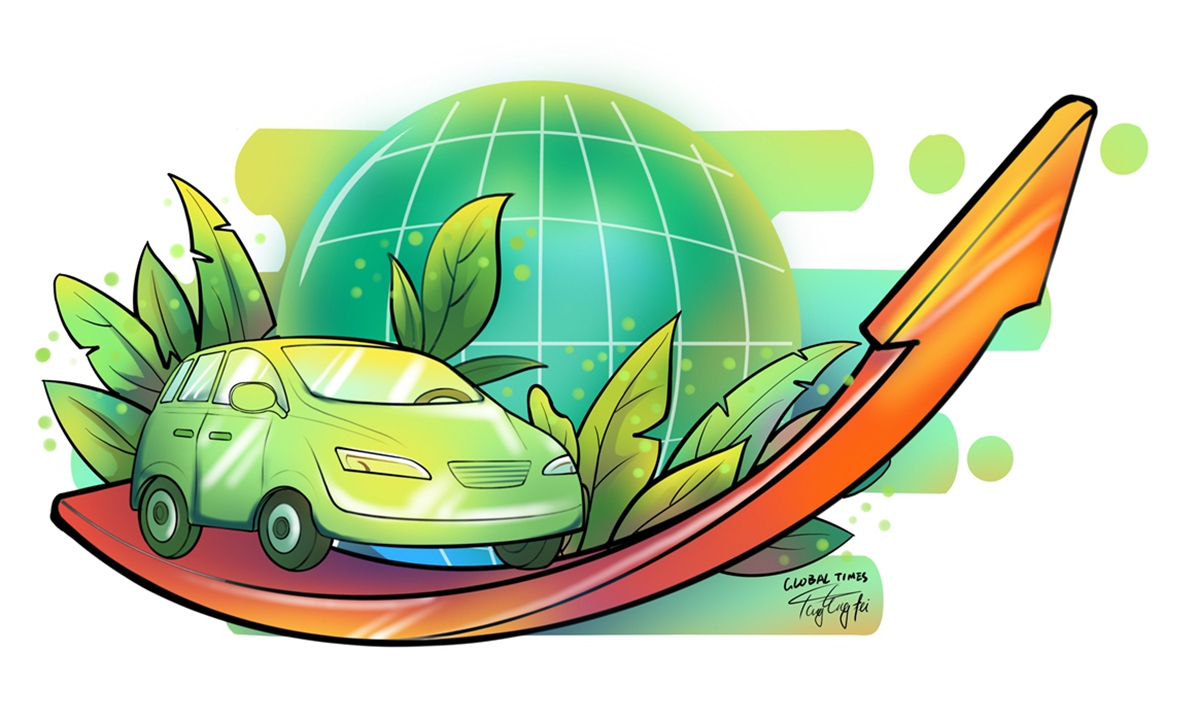
Illustration: Tang Tengfei/GT
Recently, British media has widely reported that King Charles III spent 120,000 pounds ($162,660) on a Chinese-made Lotus electric SUV.
According to The Times, this "hyper-SUV" will be painted in the traditional royal claret color for the King's use on non-official occasions.
This brings to mind another scene from over 120 years ago. Around 1901 during the Qing Dynasty, a car purchased from America (some say Germany) was presented as a birthday gift to Empress Dowager Cixi, becoming a royal vehicle. At that time, this "foreign car" caused quite a stir in the Forbidden City.
Over a century later, the direction of automobile trade across oceans has reversed from Empress Dowager Cixi's "foreign car" to King Charles' SUV.
Back then, it was "the East accepting advanced Western technology." Today, it's "the West purchasing leading Eastern products." This represents a fascinating evolution of industrialization and signals that East-West relations have entered a new phase.
British media's extensive coverage of this story stems from the fact that while the car bears a British brand, it is manufactured in Wuhan, China. The Spectator stated in the article "Is it wise for King Charles to drive a Chinese-made EV?": "Once, the then-Prince of Wales held China in contempt, but now he is King, he is happy to buy their cars and therefore further their technological economy, rather than directly investing in his own country's. Plus ca change, alas."
Evidently, some British are still evaluating Chinese technology through the lens of values. If history is a psychological massage therapist, then it is currently providing a difficult course of adjustment therapy for British and Western society.
For a long time, Western society's collective subconscious has deeply entrenched the belief that advanced technology should flow from West to East and that innovation can only radiate from the "center of civilization" to the "periphery." This cognitive framework is a legacy of the colonial era and an essential pillar of Western identity and values.
Technological leadership has become a core element of Western civilizational superiority. Just as beautiful jewelry comes from Paris, and precision watches from Switzerland, advanced automobiles should naturally come from Germany, Italy or Britain. However, such "technological standards" also highlight value standards, suggesting China should follow the Western roadmap.
However, while China has been charting its development path based on its practical realities, Chinese companies have also begun breaking free from technological dependencies.
Building upon what they've learned from others, they have independently developed core technologies for new energy vehicles and gradually taken the global lead. What Western society now faces is not merely a choice of "to buy or not to buy" but a psychological adjustment to China's development - though understanding China's development path may come more slowly than accepting its technology.
The success of China's electric vehicle industry has profound underpinnings: It hasn't followed the old path of Western powers, which relied on colonial expansion to acquire resources, but has instead cultivated technological innovations on its own soil through independent innovation.
This self-reliant industrial development path not only overturns the traditional notion that "technology must be imported from the West" but also provides a new modernization route.
When King Charles, consistent with his long-advocated environmental principles, chose an SUV manufactured in Wuhan, many saw this as an indirect endorsement of China's development model.
This incident in Britain is just a microcosm of a larger trend. In fact, an increasing number of Chinese innovations are rewriting the global technological landscape, from Huawei's 5G technology to NIO and BYD's electric vehicles, from DJI's drones to China's high-speed railways. The backdrop for this interaction is China's chosen development path.
History never stands still, and cars often need to shift gears when moving forward. China and the West must find their own paths in this new era of diverse innovation.
The author is a senior editor with the People's Daily and currently a senior fellow with the Chongyang Institute for Financial Studies at the Renmin University of China. dinggang@globaltimes.com.cn. Follow him on X @dinggangchina 中文
English
中文
English
 中文
English
中文
English
